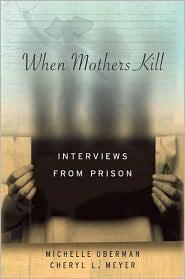When Mothers Kill: Interviews from Prison

Perhaps predictably, _When Mothers Kill: Interviews from Prison_ is not a fun or heartening read; it is a somewhat scholarly book featuring in-depth accounts of women who have murdered their own children. Yet, if you’re interested in law, crime, parent/child relationships, or social psychology and can find a way to emotionally detach while digesting these stories, this is an excellent reference and review of these very specific types of crime.
Moving away from the sensationalized stories covered by the news, When Mothers Kill is an intense and necessary factual review of a variety of maternal filicide cases, featuring anonymized interviews with convicted, incarcerated women. Co-authors Oberman and Meyer are experts on the subject, the team behind 2001’s Mothers Who Kill Their Children: Understanding the Acts of Moms from Susan Smith to the "Prom Mom", and are professors of law and psychology, respectively. Through their growing body of research, readers can begin to more sympathetically understand women who kill their children, whether the crimes were intentional, accidental, or somewhere in between.
While this book is fact-driven and based on horrific real-life accounts, it quickly becomes a page-turner. In a culture that feels like its veering towards natalism, I found this work of non-fiction an odd, somehow appropriate balance. Understanding motherhood as difficult and complex isn’t savory to many, especially in a society that is quick to blame mothers for events and circumstances far beyond their control. Many of the women in this book come from families of abuse, cycles of neglect, and displaced love (many holding their own conflicting feelings about motherhood), and that should be validated and understood instead of condemned, as we can be so quick to do.
My concern was whether I was interested in these cases as a way to hope for rehabilitation or because I wanted to voyeuristically peer at these women, probably not nearly as removed from me as I’d like to believe. And maybe that’s why this book is important: it reminds us that motherhood is indescribably difficult, that to have survived our own childhoods is sometimes an amazing feat, and to make it out with everyone in one piece is a substantial victory.